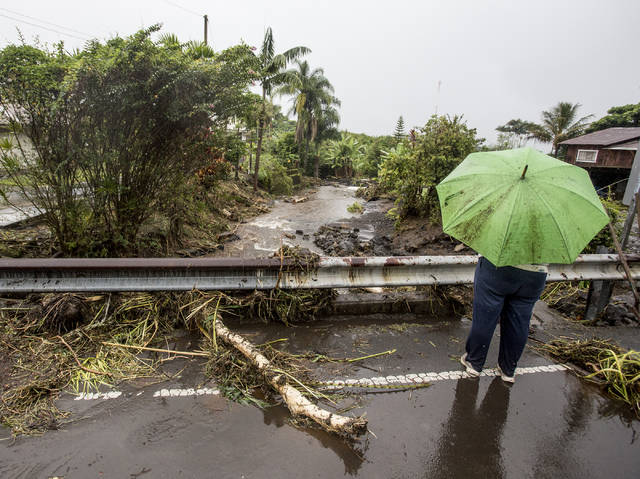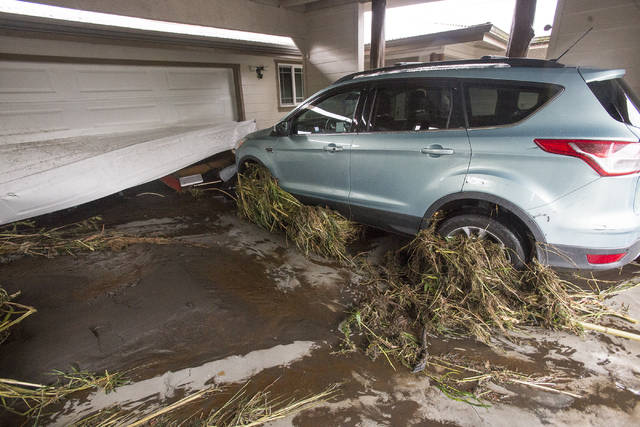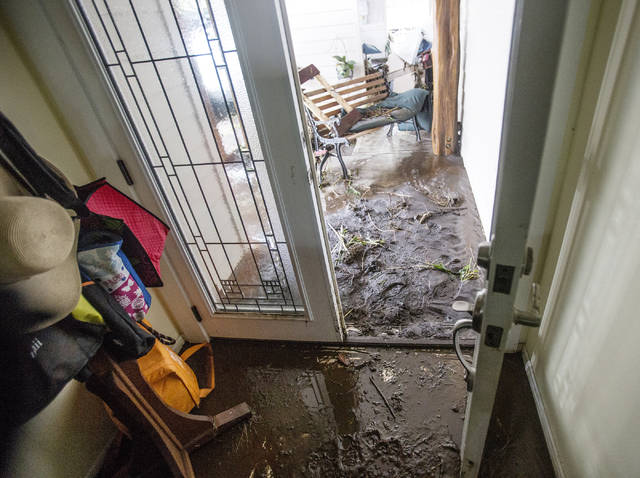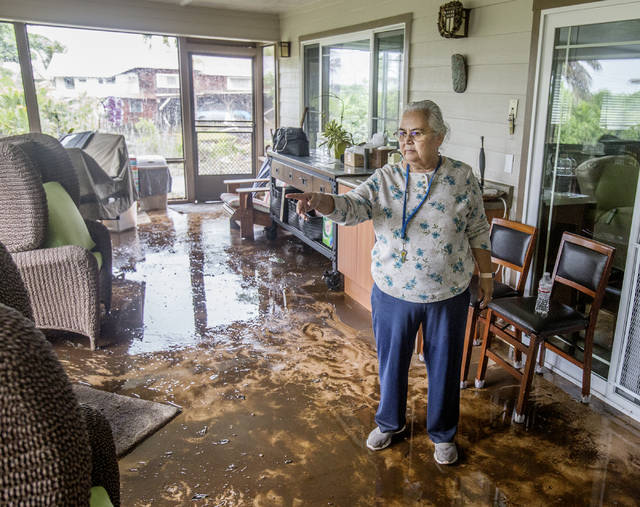Homeowners told hurricane insurance won’t cover Lane’s rain


Mud and debris are left in Collins’ garage Friday from Hurricane Lane flooding the Piihonua home Thursday night in Hilo. (HOLLYN JOHNSON/Tribune-Herald)


HILO — Mark Spain is a county firefighter, a can-do guy who responds to all types of emergencies. But Spain, whose Keaau Ag Lots home was flooded by torrential rainfall caused by Hurricane Lane said he feels “lost and helpless” after being told his hurricane insurance won’t cover the damage that caused him and his family to seek shelter in a friend’s vacation rental home.
HILO — Mark Spain is a county firefighter, a can-do guy who responds to all types of emergencies. But Spain, whose Keaau Ag Lots home was flooded by torrential rainfall caused by Hurricane Lane said he feels “lost and helpless” after being told his hurricane insurance won’t cover the damage that caused him and his family to seek shelter in a friend’s vacation rental home.
Spain and his wife Deanna, a Waiakea Elementary School teacher, lived in their home for 13 years before it was flooded by the tropical cyclone, which dropped about 50 inches of rain in some areas of East Hawaii.
“The adjuster hasn’t come out yet, but he basically told me on the phone that I’m not going to get covered,” Spain said Sunday. Spain has a homeowner’s policy with American Reliable Insurance Co. with a hurricane rider, but said he was told since the home wasn’t damaged by the hurricane’s winds, it’s unlikely they will be covered for their losses.
“The water came in through the back and flooded our whole house,” Spain said. “There was about 6 inches of water in my house, so flooring, drywall, appliances, our TVs, you know, pretty much anything that was hooked up to the electric got wasted.”
Flood insurance, which can be expensive, and is usually bought through the Federal Emergency Management Agency’s National Flood Insurance Program. The Spains, who have two children, didn’t have that coverage.
“When I bought my home, the bank told me don’t worry about flood insurance because my home isn’t in a flood zone. So that is why I didn’t get flood insurance,” Spain said. “I never knew, but I was told a couple of days ago as soon as the rain hits the ground it’s considered flooding.”
Virginia Aragon-Barnes, her husband and their two children live in a Kaumana City home. Describing herself as a “responsible homeowner” who boards up windows and does what’s directed by authorities during a hurricane, she too said the family’s home insurer, State Farm, told them their losses would not be covered by the hurricane rider on their policy.
“It was a hurricane, right? … So I thought we’re covered,” she said.
Aragon-Barnes said the family’s home was flooded by the deluge on Thursday night and Friday morning.
“It was coming in from this side lot that’s next to us an overflowing our little rock wall. … It went about ankle-deep,” she said. “I put my claim in on the State Farm website. First time in nine years that we lived there. Never missed a payment. We were doing what we thought we were supposed to be doing. We were told that hurricane damage, it would be covered. And it’s a mandatory thing for us. Otherwise we wouldn’t be able to get a (mortgage) loan. We couldn’t even have bought that house.”
The state Department of Commerce and Consumer Affairs publication “My Insurance Doesn’t Cover What?” — which is on the DCCA website — states: “Hurricane insurance can supplement home insurance by covering wind-related damage associated with hurricanes, which can bring heavy rains, strong winds, flying debris, and tidal surges. Just remember that homeowners and hurricane insurance does not cover most instances of flooding even during a storm. Flood insurance applies when water seeps or rushes into a home or structure during a storm.”
The publication advises homeowners to also buy a flood policy from NFIP.
“It’s frustrating when they tell us it’s not the right type of damage for our hurricane insurance,” Aragon-Barnes said.
Others are experiencing similar frustration in their attempts to get insurance carriers to reimburse them for damages from Lane’s rains. According to the last county tally, more than two dozen homes either suffered major flood damage or were destroyed by the storm, and standard homeowner’s insurance and hurricane riders won’t cover that type of damage.
“We have to rip out the flooring,” Aragon-Barnes said. “We have to pull out the drywall from the top to the floor. And our laundry room got totally flooded out. Everything has to come out. The vanities, everything just got warped and wet and will grow mold.”
According to Aragon-Barnes, volunteers from All Hands and Hearts came to their home and helped them with cleanup and disposal of ruined items, for which she’s grateful.
Another State Farm policyholder, Margaret Almada Collins, was rescued by firefighters on the night of Aug. 22 when a clogged drainage channel flooded and flooded her Piihonua home.
The floodwater washed Collins’ late husband’s Ford truck out of her carport and down the driveway and also knocked her home off the foundation. Her sport-utility vehicle was also surrounded by a thick sea of mud in the home’s carport.
Collins also has hurricane coverage, which she said will not cover her damages.
“I’m sad to report that I have also lost both cars and that the insurance will only allow me to have a rental until this next Friday the federal government has yet to declare Hawaii qualified for FEMA services so I’m still having to pay for all services out of pocket,” the 69-year-old Collins posted on Facebook Sunday.
“Flood damage or earth movement damage, such as landslides or mudslides, are not covered by the State Farm homeowners base insurance policy or the Hawaii Limited Hurricane Windstorm Coverage endorsement,” State Farm spokesman Ben Palmer said Sunday in a written statement. “Consumers may be able to purchase separate policies or endorsement for flood perils. Flood insurance is offered through FEMA’s National Flood Insurance Program.”
Collins and the Spains both have GoFundMe pages online to accept donations to help defray their storm losses, while Aragon-Barnes asked that those wishing to contribute to her family donate All Hands and Hearts.
Email John Burnett at jburnett@hawaiitribune-herald.com.



So … “hurricane” coverage just means “high wind” coverage, and not flooding, tidal surges, etc. What a rip-off!
It’s definitely misleading in that sense — insurance buyers need to put effort in to learn/know exactly what they’re getting for what they paid.
I wonder … do you think “hurricane” coverage would apply to tornadoes, or strong straight-line winds?
@Konadawn’s post would seem to indicate not, *unless* (I’m guessing) it’s a tornado generated by a (officially-classified) hurricane. It seems that a typical homeowner’s policy will often cover both of those scenarios, though, unless they’re specifically excluded. So again, it goes back to really knowing & understanding the specifics of your policies… often easier said than done when it comes to the legalese and “fine print.”
Legalese — a language foreign to ALL rational minds …
I learned this a few years ago. Unless a storm is classified as a hurricane when it makes landfall, your hurricane insurance won’t cover damage. Since historically no hurricane has ever hit the Big Island it is a rip off for us here. Interesting most lenders require it though. You are better off to get the flood insurance if you are in an area most likely to be affected by a flood from the outskirts of a hurricane.
From what I’ve been reading, even the flood insurance has little quirks and disqualifiers. As one apparent example: a flood is defined by NFIP as “a general and temporary condition of partial or complete inundation of two or more acres of normally dry land area or of two or more properties (at least one of which is your property).”
So it sounds as though some people’s homes were *not* covered when floodwaters rushed thru their property, but left their neighbors unscathed due to quirks in the local drainage patterns. In other words, that situation technically did not meet NFIP’s definition of a “flood,” and therefore is not covered. Would be interesting to hear this confirmed by anyone in that situation.
Thanks for the info. You would think of all the things our self praising government has their nose in they would make sure due to our regional Weather/Geological activity we have they would make sure the residents we provided affordable coverage.
Any damage from water coming through the roof (rather than rising water from a flood) should be covered under a standard homeowner’s policy. So if the roof suffered leaks, you should have coverage.
This is what happens when people don’t read the fine print of their insurance policies. I was even told by my agent that hurricane insurance is for damages from wind, not water. Water damage is not covered without flood insurance and if you are not in a flood zone the banks don’t require it. I do feel sorry for all of these folks who didn’t do their homework, but then again, who would have ever anticipated the severe flooding we had last month? With climate change ramping up, we should expect more of this in the future. Eyes wide open.